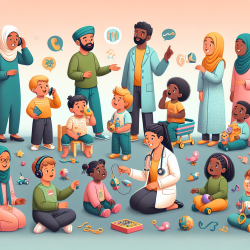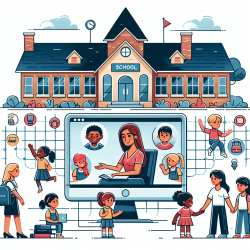Unilateral hearing loss (UHL) in children is often underestimated due to its classification as a "minimal impairment." However, recent research highlights significant impacts on language development and communication skills. This blog post explores findings from a systematic review titled "Language Disorders in Children with Unilateral Hearing Loss" and offers insights for practitioners aiming to improve their therapeutic approaches.
The Impact of Unilateral Hearing Loss on Language Development
The systematic review conducted by Mondelli et al. (2013) underscores the critical period of childhood for language acquisition and auditory maturation. While UHL is frequently diagnosed around school age, its effects can manifest much earlier. The study reveals that children with UHL score lower on both receptive and expressive language tests compared to their peers with normal hearing. However, they tend to perform better than those with bilateral hearing loss.
This finding emphasizes the need for early identification and intervention to mitigate potential language difficulties. Practitioners should be aware that even minimal hearing impairments can significantly affect a child's ability to understand and produce language.
Key Findings for Practitioners
- Diverse Testing Approaches: The review identified 12 different tests used to assess language in children with UHL, highlighting a lack of standardized evaluation methods. Practitioners should consider incorporating a variety of tests to capture the full spectrum of language abilities.
- Expressive vs. Receptive Language: A greater focus was placed on expressive language assessment (75% of tests) compared to receptive language (25%). This suggests a need for balanced evaluation strategies that address both aspects of communication.
- Cognitive Considerations: Despite lower language scores, children with UHL often perform similarly to their peers in cognitive assessments. This indicates that their challenges are more specific to auditory processing and language rather than general cognitive abilities.
Encouraging Further Research
The review concludes that more research is needed to understand the nuances of UHL's impact on language development. Practitioners are encouraged to advocate for longitudinal studies that explore these effects over time and across diverse populations. Such research could lead to standardized testing protocols and more effective intervention strategies.
Practical Recommendations for Practitioners
- Early Intervention: Advocate for early screening and intervention programs to identify UHL as soon as possible.
- Diverse Assessment Tools: Use a variety of assessment tools to gain a comprehensive understanding of each child's unique language profile.
- Cultural Sensitivity: Consider cultural and linguistic differences when assessing and planning interventions for children with UHL.
- Family Involvement: Engage families in the therapeutic process to ensure consistent support across home and educational environments.
The journey to understanding and supporting children with UHL is ongoing. By staying informed about the latest research and adapting practices accordingly, practitioners can make a significant difference in the lives of these children.










